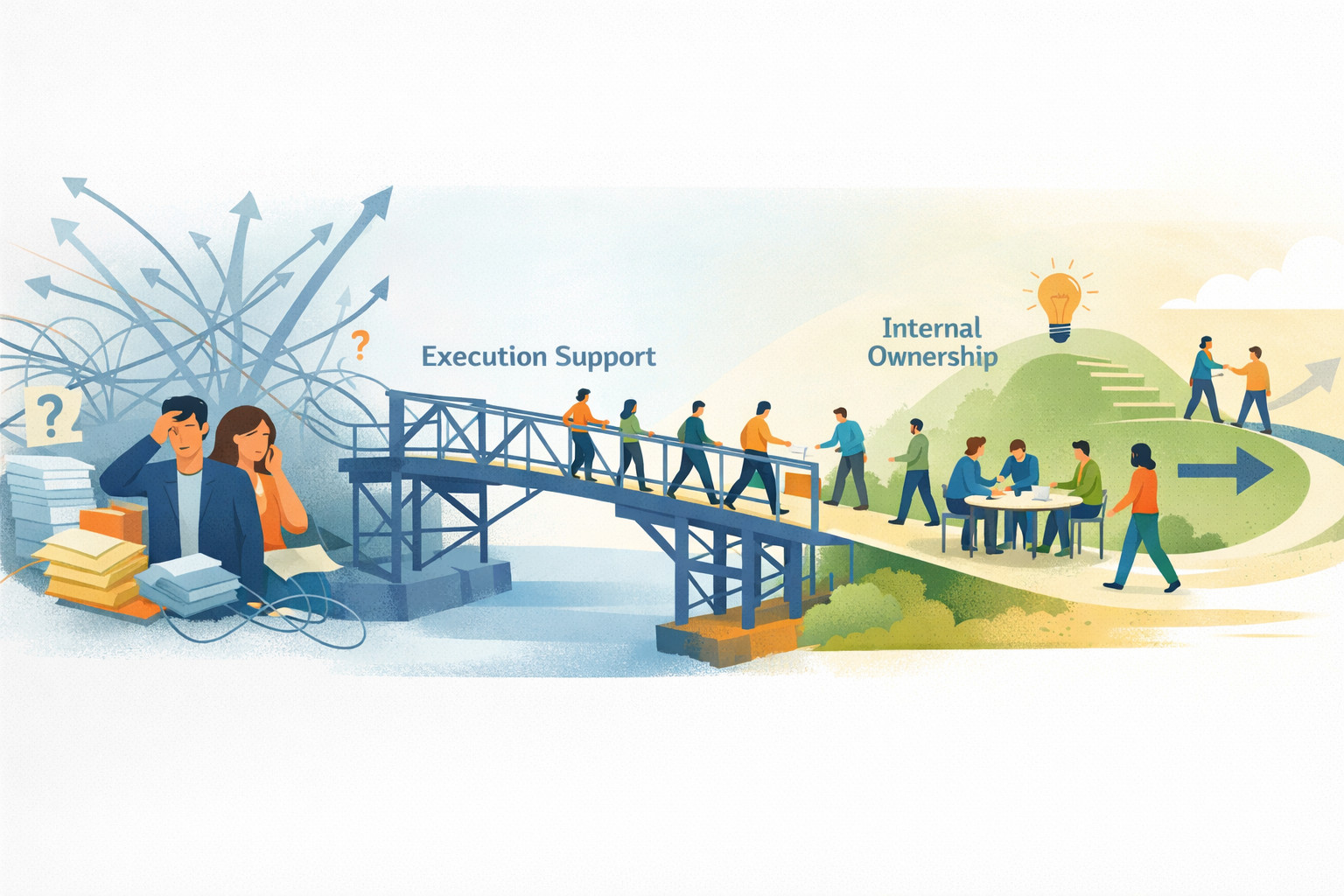Fractional HR for Tech Startups: When It Works — and When It Doesn’t
Fractional HR is often sold as a flexible, lower-cost alternative to a full-time HR hire.
For Series A–C tech startups, that framing is misleading.
These issues rarely show up as obvious HR failures — they surface as slowed execution, unclear ownership, and founders being pulled back into decisions.
The real question isn’t whether to use fractional HR —
it’s what problem you expect it to solve.
Most founders turn to fractional HR for the wrong reason
Founders rarely wake up thinking, “We need HR.”
They say things like:
- “Hiring feels risky.”
- “Decisions take too long.”
- “I’m still involved in every people call.”
- “Execution is slower than it should be.”
Fractional HR becomes the label for that discomfort.
Not because HR is broken —
but because execution has started to feel heavier, and the system no longer absorbs decisions cleanly.
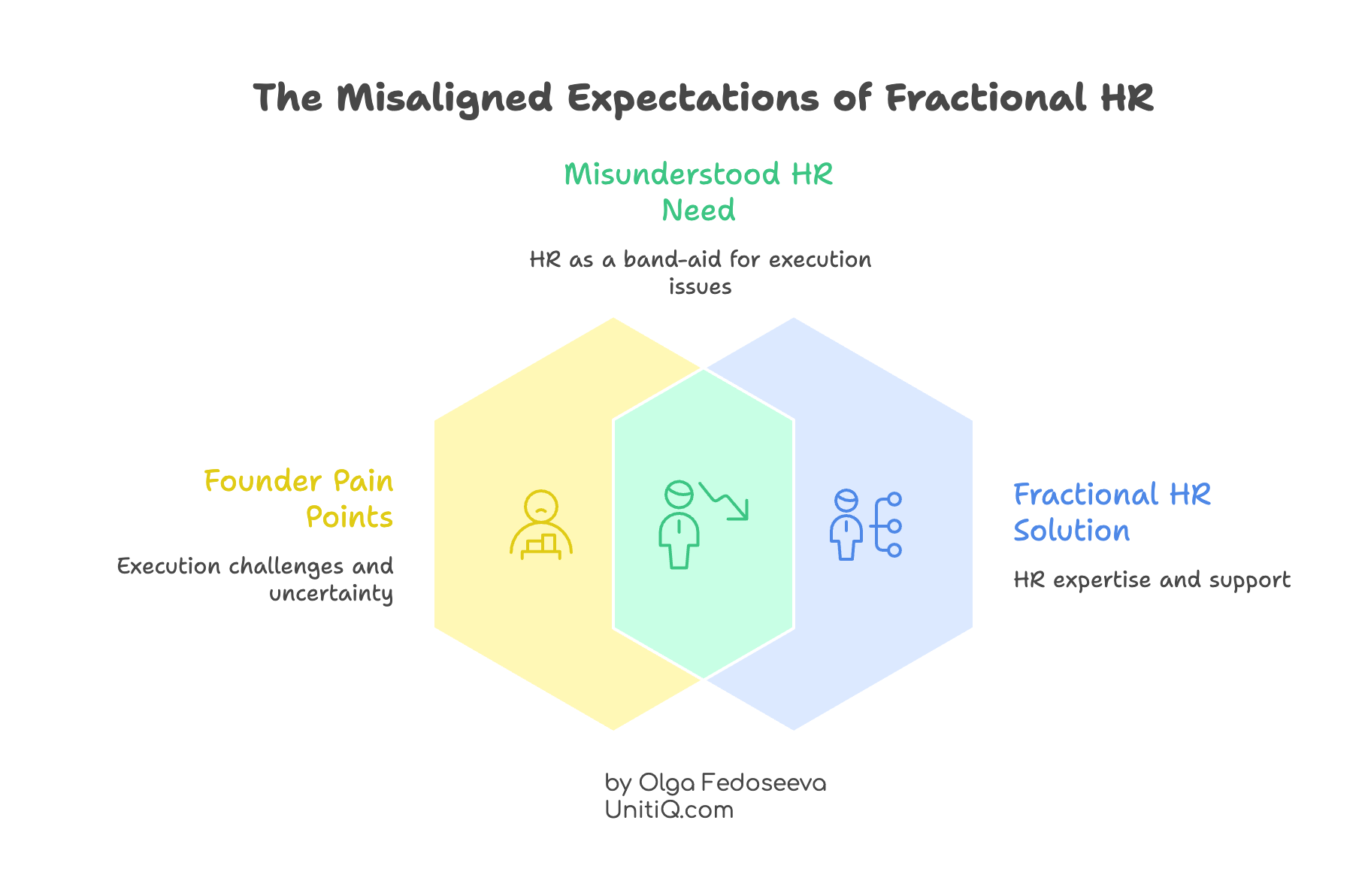
At this point, founders don’t want admin help.
They want certainty.
They want hiring decisions to feel safe again.
They want to step back without things stalling.
Fractional HR is brought in as a solution —
often without recognising the real problem it’s meant to fix.
What’s usually missing at this stage is a system that filters for execution capability before hiring even begins.
Why Series A–C startups look for fractional HR
By the time a startup reaches Series A or B, patterns emerge:
- hiring slows instead of accelerating execution
- founders stay deeply involved in people decisions
- roles exist, but ownership is unclear
- mis-hires are costly and hard to unwind
- execution depends on a few individuals
Without explicitly defining what must be true for a hire to succeed, teams default to opinion and caution.
Fractional HR is often brought in as a response to this pressure.
By this point, mistakes haven’t failed loudly — they’ve accumulated quietly until execution starts slipping.
But most engagements fail because the scope is wrong.
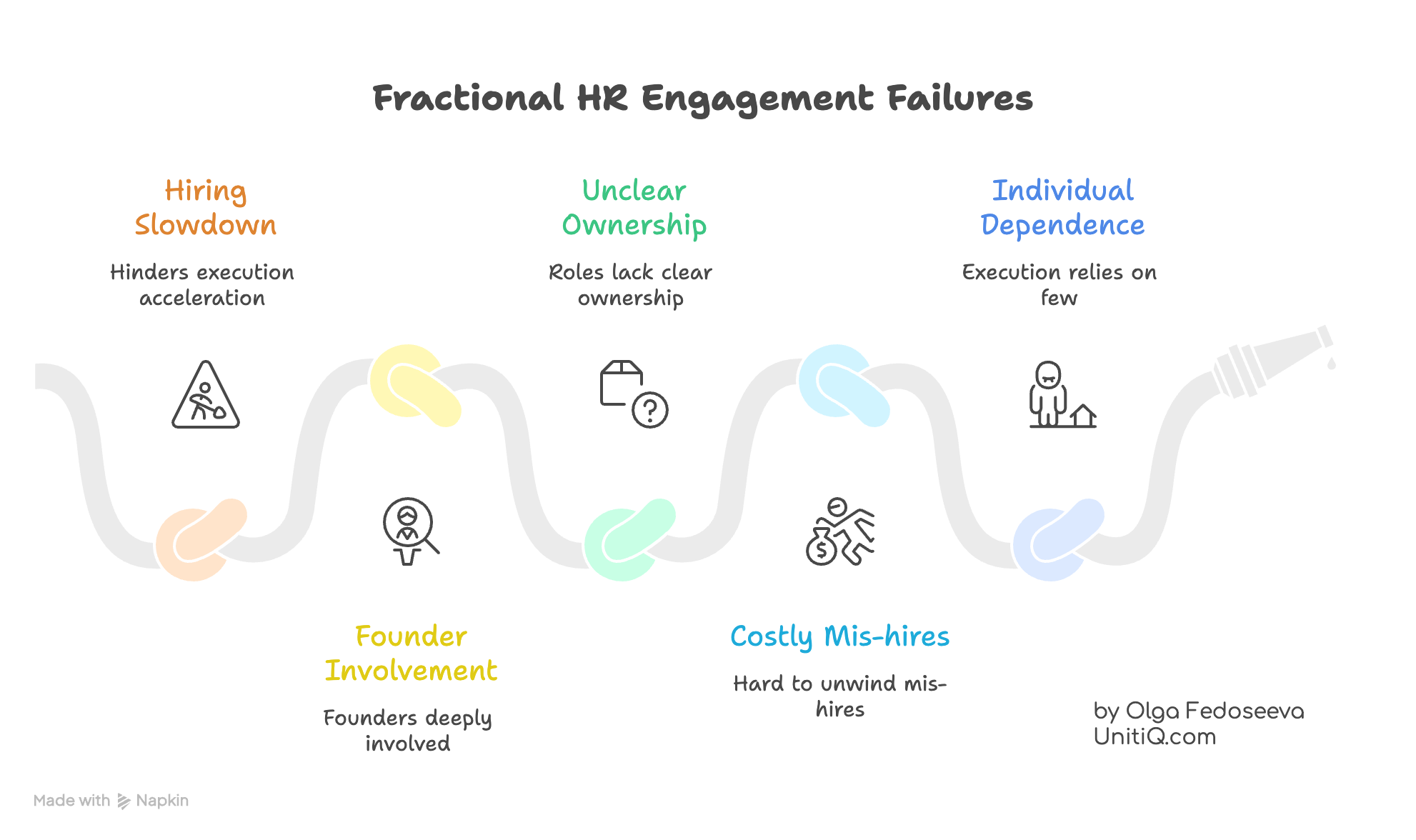
Fractional HR doesn’t fail because it’s fractional
Fractional HR fails when it optimises for the wrong thing.
Most setups focus on:
- adding process
- improving documentation
- standardising evaluation
- increasing fairness
None of these are inherently bad.
But they don’t solve the core problem:
who owns decisions when things are unclear.
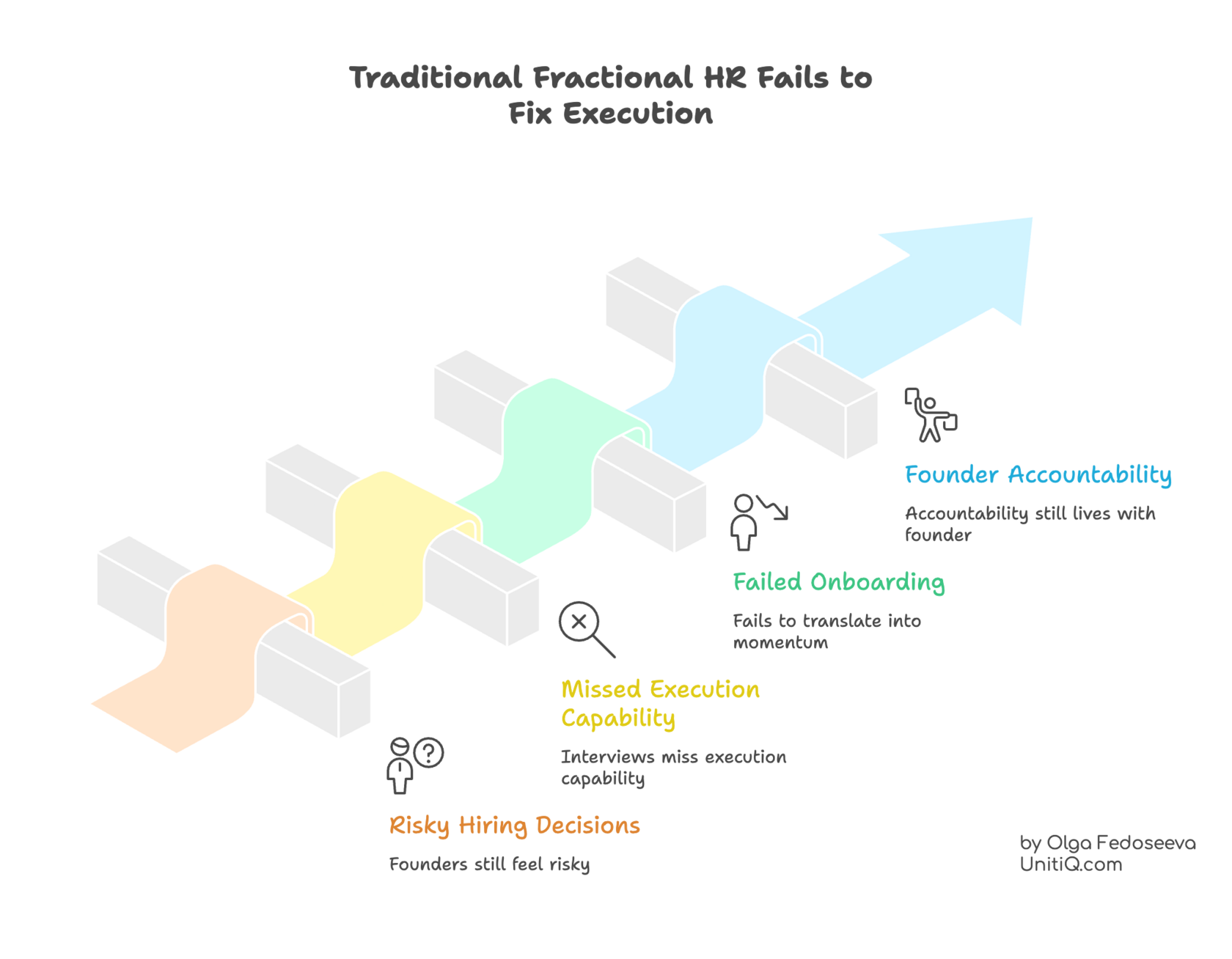
When ownership is not designed:
- hiring decisions default to consensus
- risk is pushed upward
- founders become permanent backstops
The system looks more professional.
But execution gets slower.
This is not a people failure.
It’s a system reacting to uncertainty.
Fractional HR works only when it reduces that uncertainty —
not when it organises around it.
The difference between fractional HR and fractional execution ownership
For Series A–C tech startups, effective fractional HR must operate differently.
It must:
- work backwards from execution outcomes
- redesign hiring around execution capability
- introduce hiring maps and role clarity
- fix interview signal quality
- align onboarding to real work, not values decks
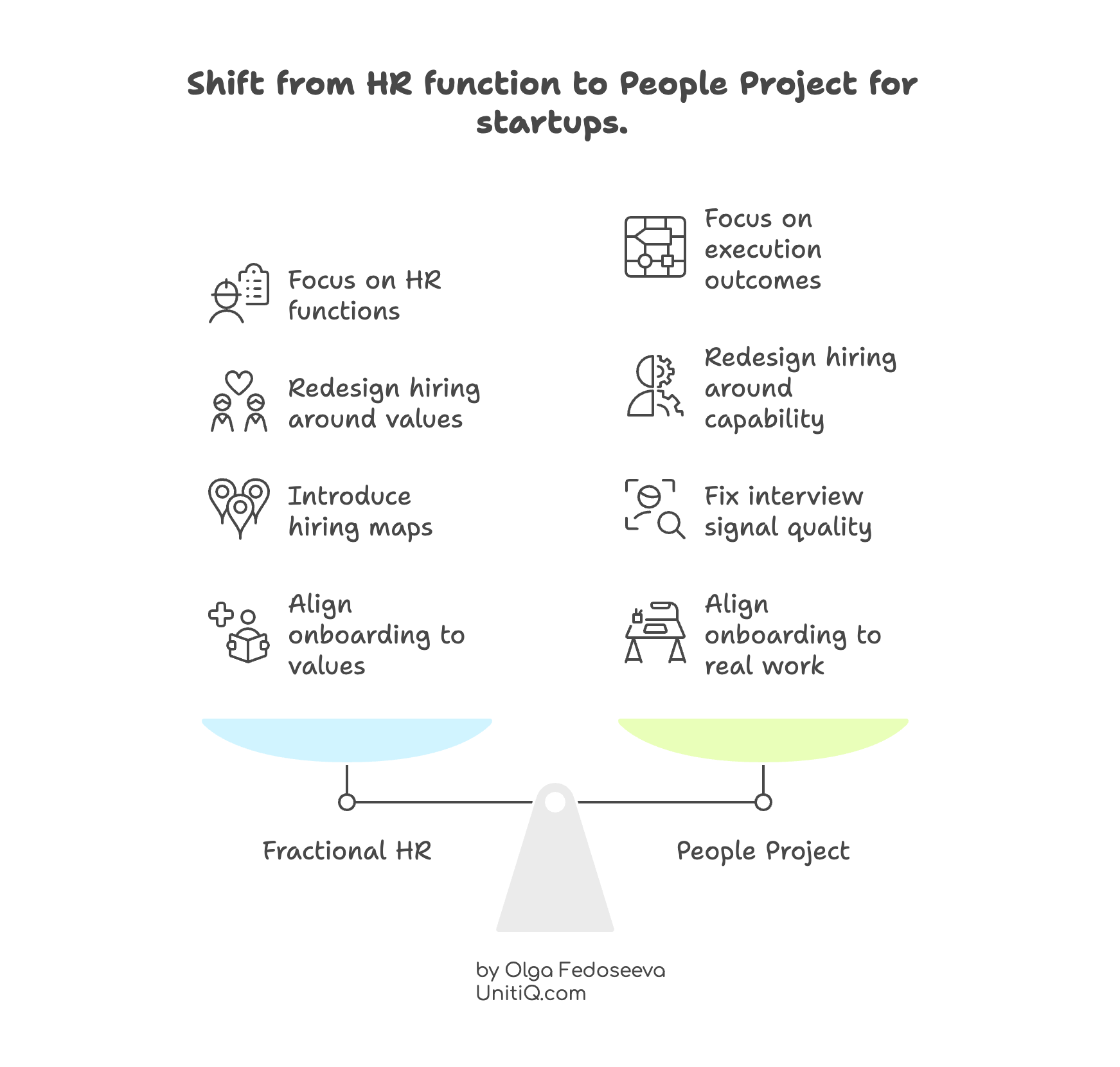
In other words, it must function as a People Project, not an HR function.
Why hiring is where execution first breaks
Startups don’t lose execution because they stop hiring.
They lose execution because hiring quietly changes shape as the company grows.
Early on:
- one founder
- one decision
- one clear yes or no
Later:
- more interviewers
- more feedback
- more alignment
- more caution
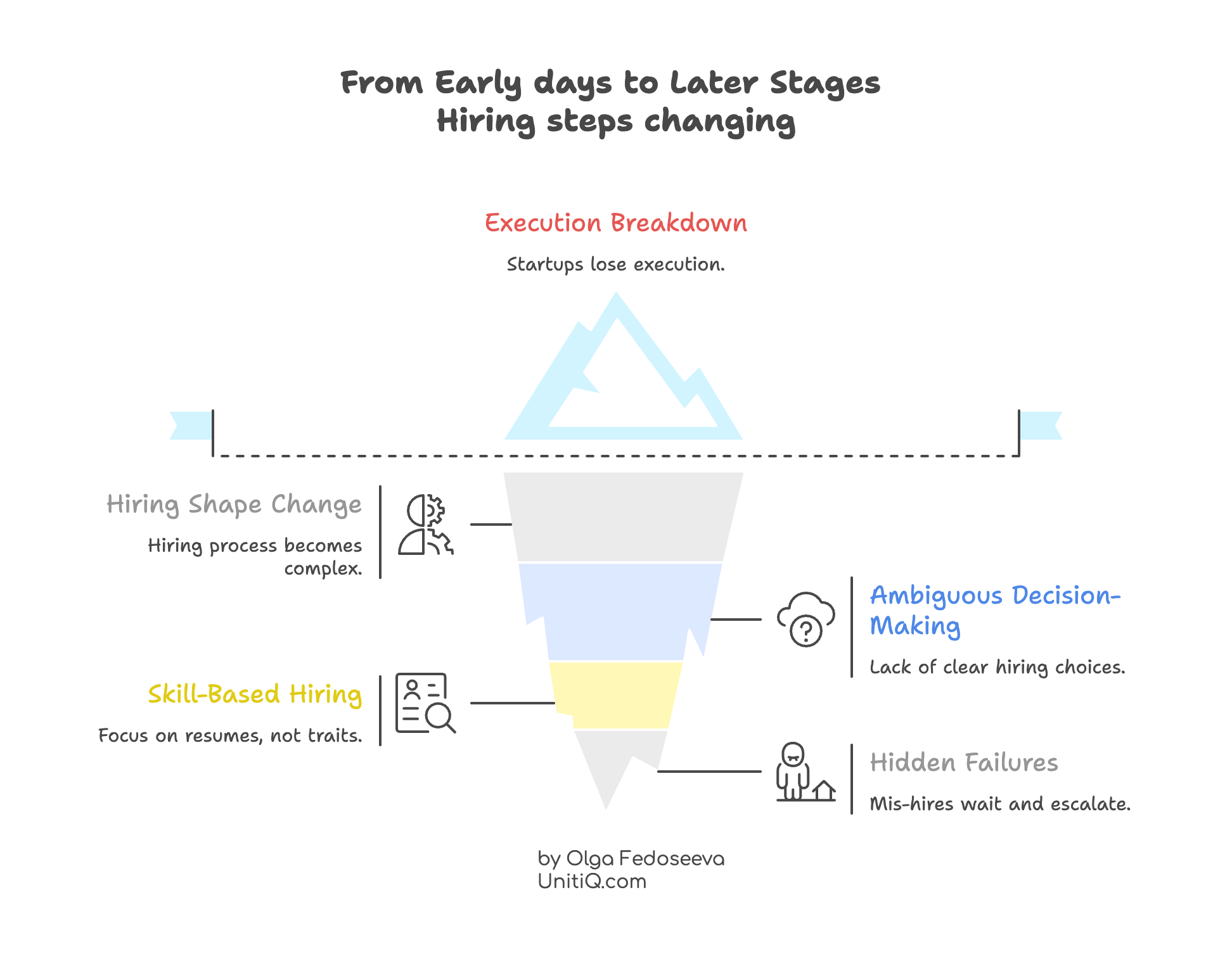
The intention is safety.
The outcome is ambiguity.
As hiring panels grow, ownership quietly disappears — opinions increase, but decisions stall.
Founders still believe they hire strong people.
And on paper, they do.
Strong resumes.
Relevant experience.
Good interviews.
But hiring for skills and pedigree says very little about:
- decision-making under uncertainty
- ownership without permission
- trade-offs when priorities conflict
So mis-hires don’t fail loudly.
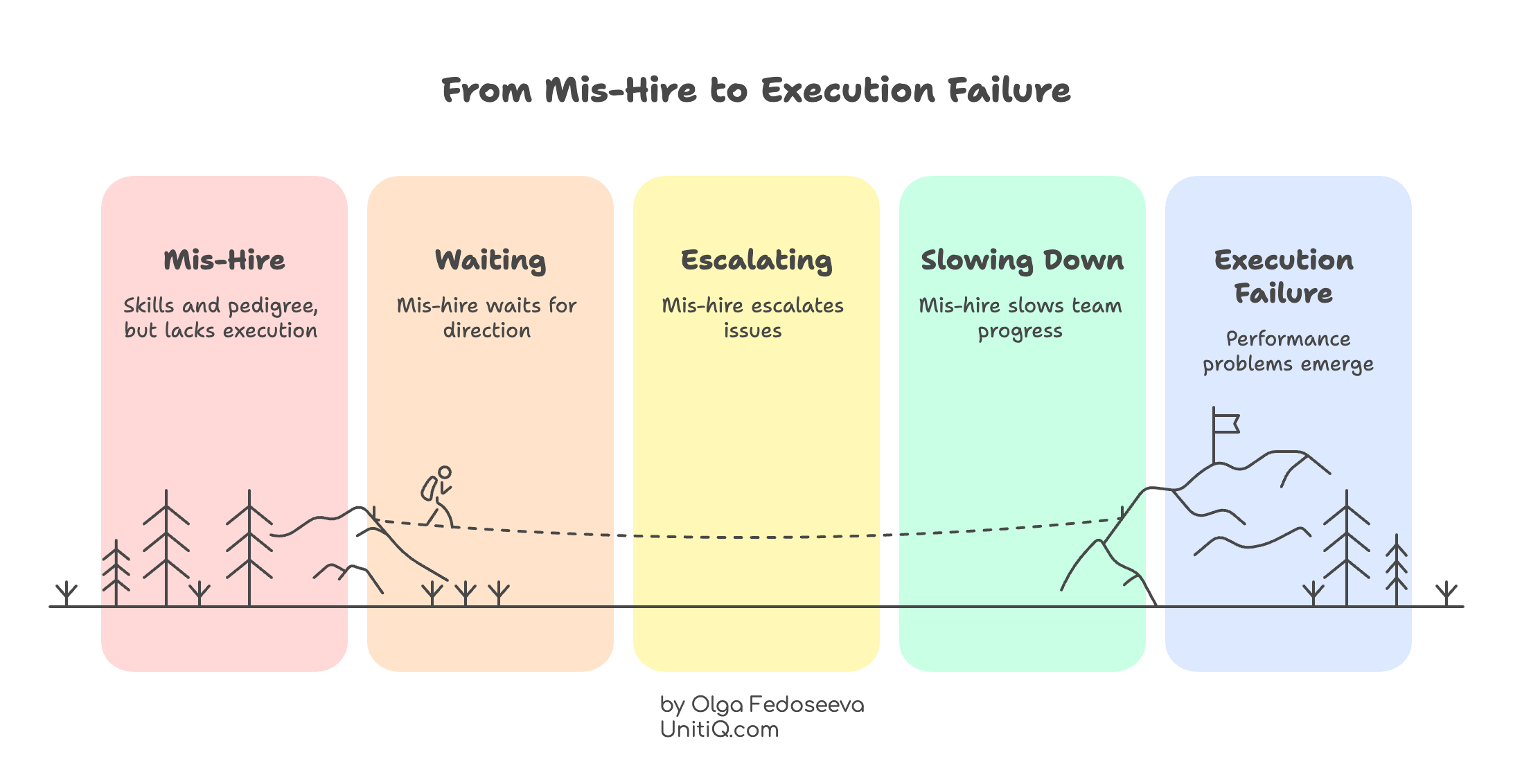
They wait. They escalate. They slow things down.
This is where execution first degrades —
long before performance problems show up.
Fractional HR only matters if it addresses this point of failure.
When fractional HR actually works for startups
Fractional HR creates value when it is used to:
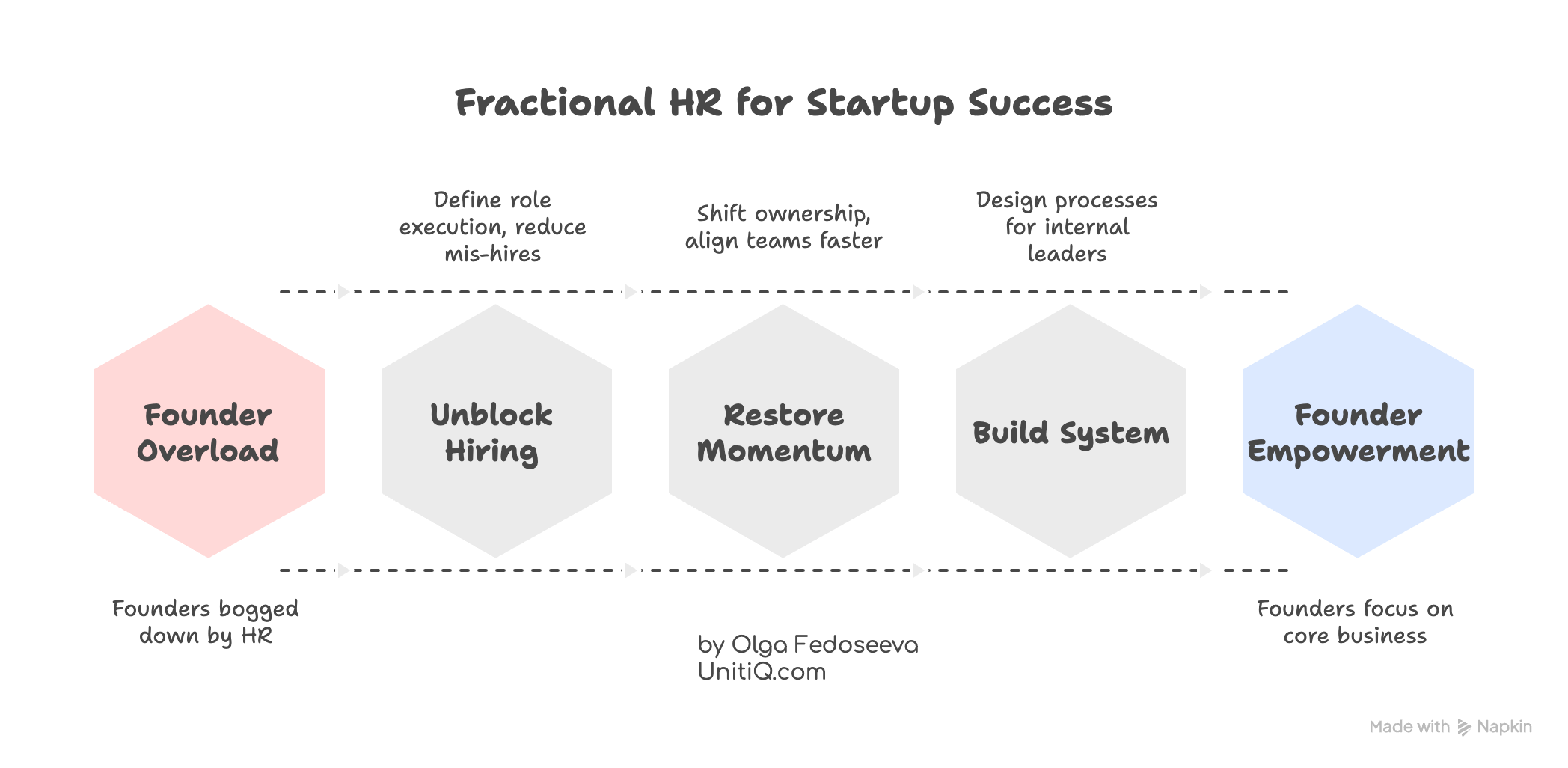
Unblock hiring
- Define what “good” execution looks like per role
- Reduce mis-hires before they compound
Restore momentum
- Shift execution ownership out of the founder
- Align teams faster after hiring
Build the system — not dependency
- Design processes that internal leaders can own
- Make itself obsolete over time
If founders feel more involved after six months, the model has failed.
When you should not use fractional HR
Fractional HR is the wrong solution if:
- the goal is “someone to handle HR”
- leadership expects motivation fixes
- execution problems are denied or externalized
- founders want delegation without clarity
In these cases, fractional HR becomes an expensive distraction.
Fractional HR as a transition, not a destination
The right question for Series A–C startups is:
“What must be true so we no longer need fractional support?”
The answer usually includes:
- execution-ready hiring
- clear decision ownership
- aligned onboarding
- predictable execution rhythms
- founders stepping back from day-to-day decisions
Fractional HR should accelerate this transition — not replace it.
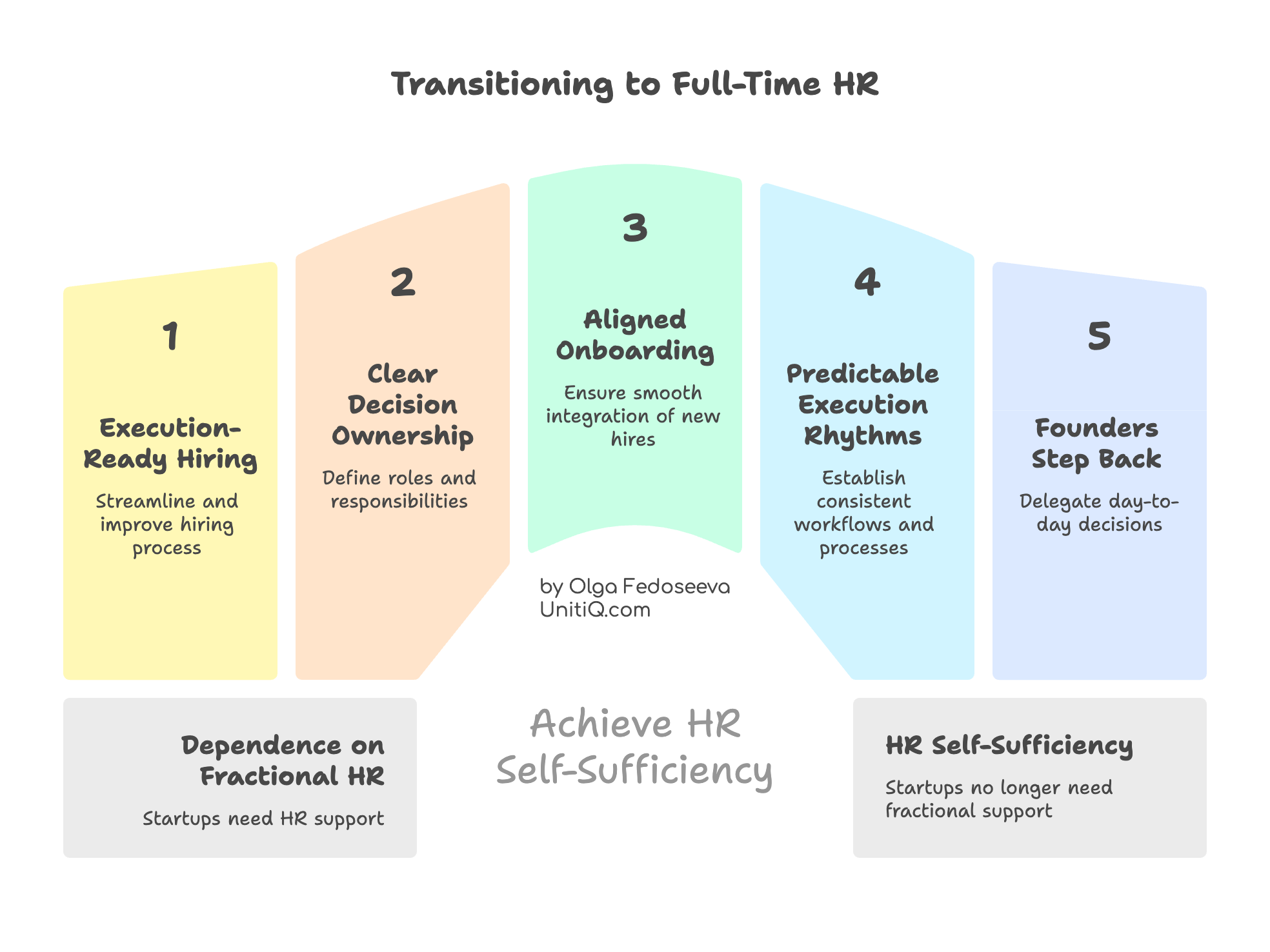
The test: is fractional HR reducing execution load?
There’s a simple way to tell whether fractional HR is actually working.
Ask one question:
“Which part of execution becomes lighter because this setup exists?”
Not:
- “What processes are in place?”
- “What policies are covered?”
- “What tools are implemented?”
But:
- what decisions move faster
- where founders are no longer needed
- which hires no longer feel risky
If the answer is unclear,
fractional HR is adding structure — not capability.
And structure without ownership
is how execution quietly slows.
How UnitiQ approaches fractional People Projects
UnitiQ does not provide generic fractional HR.
We work with Series A–C tech startups in:
- Fintech
- AI
- Crypto / Blockchain
- Robotics
- Mobility
to deliver execution-aligned People Projects that:
- fix hiring systems first
- reduce founder involvement
- prevent mis-hires
- restore momentum
The goal is not HR maturity.
The goal is execution stability.
If you want to sanity-check what’s breaking in your hiring system, we can walk through it together.
👉 Book a conversation
👉 Book a conversation
Summary
Fractional HR is not a cost-saving tactic.
For tech startups and scale-ups, it is a temporary execution intervention.
Used correctly, it:
- gets founders out of hiring mode
- aligns teams faster
- prevents burnout and mis-hires
- builds internal ownership
Used incorrectly, it adds process without progress.
This only works when fractional talent acquisition is used to stabilise execution, not just increase hiring activity.
About the author
Olga Fedoseeva is the Founder of UnitiQ, a talent acquisition and People Projects partner for Series A–C tech startups across EU, UKI, and MENA.
She works with founders in Fintech, AI, Crypto, and Robotics who are stuck in hiring or execution mode — helping them regain momentum through execution-first hiring systems and focused People Projects.
